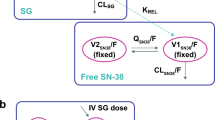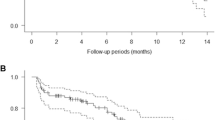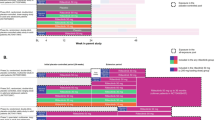Abstract
Purpose
To evaluate the safety, tolerability, pharmacokinetics and antitumor activities of famitinib (famitinib l-malate), a novel oral multitargeting tyrosine kinase inhibitor that acts against vascular endothelial growth factor receptor-2, platelet-derived growth factor receptor, stem cell factor receptor (c-kit), FMS-like tyrosine kinase-3 receptor and protooncogene tyrosine kinase receptor in patients with advanced solid cancer.
Methods
Patients received once daily oral famitinib. Doses were increased from 4 to 8, 13, 20, 27, 24, 25 and eventually 30 mg. Each cycle was defined as 28 days. The pharmacokinetic profile and various biomarkers were evaluated during the first cycle. Antitumor efficacy was evaluated every 8 weeks.
Results
Fifty-four patients were evaluable for safety and efficacy. Dose-limiting toxicities were observed in 2 of 3 patients at 30 mg. The dose-limiting toxicities observed in the first cycle of famitinib treatment included hypertension, hand-foot skin reaction and diarrhea. Grade 3 hypertriglyceridemia/hypercholesterolemia and proteinuria were notable side effects in the subsequent treatment cycles. Other common side effects included bone marrow suppression, oral mucositis, fatigue, pain, elevated transaminase or bilirubin, peripheral sensory disturbance and hypothyroidism, most of which were mild to moderate in severity. Pharmacokinetic studies revealed no significant accumulation of famitinib or its major metabolite, M3. The half-lives of famitinib and M3 were approximately 28.7–33.8 and 41.3–47.7 h, respectively. Food demonstrated a minimal effect on the pharmacokinetics of famitinib. Eight partial responses were determined, including 6 cases of renal cell carcinoma, 1 case of gastrointestinal stromal tumor (GIST) and 1 case of alveolar soft part sarcoma. Fourteen patients demonstrated stable disease with various degrees of tumor shrinkage.
Conclusions
Famitinib is generally well tolerated. Famitinib demonstrates a wide spectrum of antitumor activities, which warrants further study in renal cell carcinoma, GIST, hepatocellular carcinoma and soft tissue sarcoma. The recommended dose for future phase II clinical trials is 25 mg.




Similar content being viewed by others
References
Hurwitz H, Fehrenbacher L, Novotny W, Cartwright T, Hainsworth J, Heim W et al (2004) Bevacizumab plus irinotecan, fluorouracil, and leucovorin for metastatic colorectal cancer. N Engl J Med 350(23):2335–2342
Escudier B, Eisen T, Stadler WM, Szczylik C, Oudard S, Siebels M et al (2007) Sorafenib in advanced clear-cell renal-cell carcinoma. N Engl J Med 356(2):125–134
Motzer RJ, Hutson TE, Tomczak P, Michaelson MD, Bukowski RM, Rixe O et al (2007) Sunitinib versus interferon alfa in metastatic renal-cell carcinoma. N Engl J Med 356(2):115–124
Llovet JM, Ricci S, Mazzaferro V, Hilgard P, Gane E, Blanc JF et al (2008) Sorafenib in advanced hepatocellular carcinoma. N Engl J Med 359(4):378–390
Demetri GD, van Oosterom AT, Garrett CR, Hilgard P, Gane E, Blanc JF et al (2006) Efficacy and safety of sunitinib in patients with advanced gastrointestinal stromal tumour after failure of imatinib: a randomised controlled trial. Lancet 368(9544):1329–1338
Lou LG, Mi Y, Xu YP, Chengying Xie, Zhao HB (2011) Preclinical antitumor study of famitinib, an orally available multi-targeted kinase inhibitor of VEGFR/PDGFR/c-Kit in phase I clinical trials. In Proceedings of the 102 th annual meeting of the American Association for Cancer Research, 2011 Apr 2–6. AACR, Orlando, Florida, Abstr3604
Xie C, Zhou J, Guo Z, Diao X, Gao Z, Zhong D et al (2013) Metabolism and bioactivation of famitinib, a novel inhibitor of receptor tyrosine kinase, in cancer patients. Br J Pharmacol 168(7):1687–1706
http://www.nccn.org/professionals/physician_gls/pdf/kidney.pdf
Omura GA (2003) Modified Fibonacci search. J Clin Oncol 21(16):3177
Bello CL, Sherman L, Zhou J, Verkh L, Smeraglia J, Mount J et al (2006) Effect of food on the pharmacokinetics of sunitinib malate (SU11248), a multi-targeted receptor tyrosine kinase inhibitor: results from a phase I study in healthy subjects. Anticancer Drugs 17(3):353–358
Faivre S, Delbaldoc C, Vera K, Robert C, Lozahic S, Lassau N et al (2006) Safety, pharmacokinetic, and antitumor activity of SU11248, a novel oral multitarget tyrosine kinase inhibitor, in patients with cancer. J Clin Oncol 24(1):25–35
Yoo C, Kim JE, Lee JL, Ahn JH, Lee DH, Lee JS et al (2010) The efficacy and safety of sunitinib in Korean patients with advanced renal cell carcinoma: high incidence of toxicity leads to frequent dose reduction. Jpn J Clin Oncol 40(10):980–985
Uemura H, Shinohara N, Yuasa T, Tomita Y, Fujimoto H, Niwakawa M et al (2010) A Phase II study of sunitinib in Japanese patients with metastatic renal cell carcinoma: insights into the treatment, efficacy and safety. Jpn J Clin Oncol 40(3):194–202
Qin S, Jin J, Guo J, Wang J, Zhou F, Huang Y et al (2012) A phase IV multicenter study of the efficacy and safety of sunitinib as first-line therapy in Chinese patients with metastatic renal cell carcinoma. Ann Oncol 23(Suppl 9):abstr851p
Hong MH, Kim HS, Kim C, Ahn JR, Chon HJ, Shin SJ et al (2009) Treatment outcomes of sunitinib treatment in advanced renal cell carcinoma patients: a single cancer center experience in Korea. Cancer Res Treat 41(20):67–72
Atkins MB, Hidalgo M, Stadler WM, Logan TF, Dutcher JP, Hudes GR et al (2004) Randomized phase II study of multiple dose levels of CCI-779, a novel mammalian target of rapamycin kinase inhibitor, in patients with advanced refractory renal cell carcinoma. J Clin Oncol 22(5):909–918
Hudes G, Carducci M, Tomczak P, Szczylik C, Oudard S, Siebels M et al (2007) Temsirolimus, interferon alfa, or both for advanced renal-cell carcinoma. N Engl J Med 356(2):2271–2281
Motzer RJ, Escudier B, Oudard S, Hutson TE, Porta C, Bracarda S et al (2008) Efficacy of everolimus in advanced renal cell carcinoma: a double-blind, randomised, placebo-controlled phase III trial. Lancet 372(9637):449–456
Lee CK, Marschner IC, Simes RJ, Voysey M, Egleston B, Hudes G et al (2012) Increase in cholesterol predicts survival advantage in renal cell carcinoma patients treated with temsirolimus. Clin Cancer Res 18(11):3188–3196
Rini BI, Escudier B, Tomczak P, Kaprin A, Szczylik C, Hutson TE et al (2011) Comparative effectiveness of axitinib versus sorafenib in advanced renal cell carcinoma (AXIS): a randomised phase 3 trial. Lancet 378(9807):1931–1939
Tariq Mahmood S, Agresta S, Vigil CE, Rau J, Wimberger P, Sehouli J et al (2011) Phase II study of sunitinib malate, a multitargeted tyrosine kinase inhibitor in patients with relapsed or refractory soft tissue sarcomas. Focus on three prevalent histologies: leiomyosarcoma, liposarcoma and malignant fibrous histiocytoma. Int J Cancer 129(8):1963–1969
Bertuzzi A, Stroppa EM, Secondino S, Pedrazzoli P, Zucali P, Quagliuolo P et al (2010) Efficacy and toxicity of sorafenib monotherapy in patients with advanced soft tissue sarcoma failing anthracycline-based chemotherapy. J Clin Oncol 28(15s):abstr10025
Palassini E, Stacchiotti S, Negri T, Brich S, Marrari A, Morosi C et al (2010) Sunitinib malate (SM) in alveolar soft sarcoma (ASPS). J Clin Oncol 28(15s):abstr10014
Neuhaus T, Luyken J (2012) Long lasting efficacy of Sorafenib in a heavily pretreated patient with thymic carcinoma. Target Oncol 7(4):247–251
Kontovinis LF, Papazisis KT, Touplikioti P, Andreadis C, Mouratidou D, Kortsaris AH et al (2009) Sunitinib treatment for patients with clear-cell metastatic renal cell carcinoma: clinical outcomes and plasma angiogenesis markers. BMC Cancer 9:82
Conflict of interest
This research was sponsored by Jiangsu Hengrui Medicine Co. Ltd. The following author has a financial relationship to the sponsor: Jiang HY was an employee of Jiangsu Hengrui Medicine Co. Ltd.
Author information
Authors and Affiliations
Corresponding author
Rights and permissions
About this article
Cite this article
Zhou, A., Zhang, W., Chang, C. et al. Phase I study of the safety, pharmacokinetics and antitumor activity of famitinib. Cancer Chemother Pharmacol 72, 1043–1053 (2013). https://doi.org/10.1007/s00280-013-2282-y
Received:
Accepted:
Published:
Issue Date:
DOI: https://doi.org/10.1007/s00280-013-2282-y




